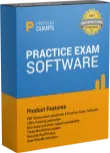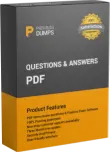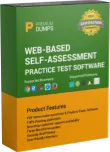
Get PECB ISO-22301-Lead-Auditor Exam Dumps
PECB ISO 22301 Lead Auditor Exam Dumps
Last Updated : May 5, 2024
Total Questions : 100
This Bundle Pack includes Following 3 Formats
Desktop Practice
Test software
Test software
Web Based
Practice Test
Practice Test
Questions &
Answers (PDF)
Answers (PDF)

ISO-22301-Lead-Auditor Desktop Practice
Test Software
Last Updated : May 5, 2024
Total Questions : 100
Total Questions : 100
$59.00

ISO-22301-Lead-Auditor Questions & Answers
(PDF)
Last Updated : May 5, 2024
Total Questions : 100
Total Questions : 100
$59.00

ISO-22301-Lead-Auditor Web Based Self Assessment Practice Test
Last Updated : May 5, 2024
100 Total Questions
Supported Browsers
Supported Platforms
License Options
$59.00
Following are some ISO-22301-Lead-Auditor Exam Questions for Review
Which team is responsible for determining how the impact of the incident is managed within the policy guidelines set by the strategic team?
Which stage helps management to define where focus and resources should be invested?
Which type of approach has a straightforward process based on informed judgement supported by appropriate guidance?
Which three types of personal interview, which differs in terms of the structure, purpose and depth of information to be elicited? (Choose two)
Which objective should be concise and unequivocal?
Unlock All Features of PECB ISO-22301-Lead-Auditor Dumps Software
Just have a look at the best and updated features of our ISO-22301-Lead-Auditor dumps which are described in detail in the following tabs. We are very confident that you will get the best deal on this platform.
Select Question
Types you want
Types you want
Set your desired
pass percentage
pass percentage
Allocate Time
(Hours: Minutes)
(Hours: Minutes)
Create Multiple
Practice test with
limited questions
Practice test with
limited questions
Customer
Support
Support
Latest Success Metrics For actual ISO-22301-Lead-Auditor Exam
This is the best time to verify your skills and accelerate your career. Check out last week's results, more than 90% of students passed their exam with good scores. You may be the Next successful Candidate.
95%
Average Passing Scores in final Exam
91%
Exactly Same Questions from these dumps
90%
Customers Passed PECB ISO-22301-Lead-Auditor exam